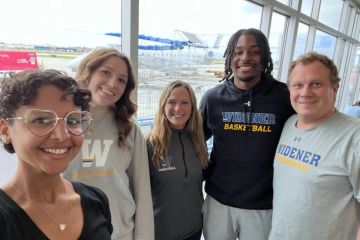Journey to Honors Week: One Student's Self-Discovery on White Privilege

Senior Julia Klinger is graduating with a degree in psychology and a minor in sociology. She recently presented her project “Discovering My White Privilege” to the Widener community as a part of the university’s Honors Week.
Klinger explored lessons learned in the Multicultural Psychology class taught by Professor Lori Simons, and how that class, and her many Widener experiences, opened her eyes to white privilege and institutional racism in our society. These transformational experiences now shape her future plans.
From the title of your Honors Week presentation, it sounds like you had an awakening about white privilege during your time at Widener. Did you have any concept of what white privilege was before you enrolled?
Growing up in South Jersey, my neighborhood as well as my school system was predominately white. I was surrounded by people of the same race and ethnicity. In my young age I did not grasp that it wasn’t an ethnically diverse community. That wasn’t something I truly noticed or understood the impact of until I enrolled at Widener University. I never thought about the idea that my success was influenced by my skin color. I had always been taught that if I just worked hard enough, I could achieve anything. However, after coming to Widener, my world view expanded and changed. I spent two years living off-campus and learning about the surrounding community, and I saw that was not the case for everyone. People of color could work just as hard as I did, if not harder, and still not receive the same benefits as me, simply because of their skin color. I made it my goal during undergrad to educate myself on the impact of racial disparities and use my white privilege to advocate for underrepresented groups.
How did your Widener classroom experiences open your eyes to white privilege?
The lessons I have learned at Widener have made me aware of the strong influences white people have had on our children’s educational experiences. Growing up, I was taught that Columbus and our forefathers were wonderful people who discovered this great land we call home. However, as I later learned, this misinterpretation of our nation’s history allows white individuals to continue to deny their privilege and fail to recognize systems that benefit the white population. At Widener, and specifically in Dr. Simons’ Multicultural Psychology course, I was taught how this privilege is commonly overlooked because it is encapsulated in everyday experiences. Through Widener, I was able to reflect on my actions as a white woman. I was able to assess my privilege and use it for anti-racism work. In doing this, I have learned strategies and actions for bringing equal access to wealth and opportunities, and ultimately how to be an ally to people of color when they are trying to make their voices heard.
What did you learn from your tutoring experience at Chester Upland School of the Arts?
Tutoring at Chester Upland School of the Arts was one of the most rewarding experiences I have had in my four years at Widener. The first day of classes I walked into my in-person classroom of fifth graders, and soon realized I was the only white individual in the room. This was one of the most uncomfortable experiences I had in my four years, and it taught me a valuable lesson. I have lived my life never having to feel uncomfortable because of my race. I was the majority race in all of my daily occurrences until that moment. I could arrange to be in the company of people of my race almost all of the time, something that is a privilege to white individuals. But tutoring was different. I felt awkward. And the children were delightful. They were curious and accepting and, in the end, taught me more than I taught them. In addition to glimpsing what it feels like to look different from everyone around you, I learned about funding disparities for racially diverse schools in low-income communities, and began to think about public school funding and concepts of institutional racism for the first time.
We like to talk about Widener providing a transformational education. How have you changed in your time here?
Prior to Widener, I was a quiet student. I did not assert my opinions in class and I kept to myself. I completed my assignments and did what was asked of me, but not much beyond that. Fast forward three years, and I became a tour guide for Widener, president of Psi Chi, the international honor society in psychology, have conducted research alongside two of my favorite professors, and I took part in Widener’s practicum/internship course that later granted me the ability to become a paid employee for Sadar Psychological, the facility where I was completing my internship. Widener has instilled me with a sense of confidence I lacked in high school. Prior to Widener, I was lost. I did not know what my strengths or interests were, let alone what I wanted to do with my life after college. Now I have a sense of purpose and direction. I have found my niche and am no longer apprehensive about my future. I am confident about my abilities and what the future has in store.
You have a strong plan for your future. How do you plan to make a difference in the world?
I will be a doctoral student in the clinical Psy.D. program at Chestnut Hill College this fall, aiming my studies toward advocating for the extension of therapy for underserved populations. A large majority of this underrepresented population is people of color who have experienced systemic and structural racism. My goal is to treat children and adolescents who are victims of trauma, and while doing so, target social factors such as divorce, poverty, neglect, etc., that undermine psychological well-being and contribute to mental illnesses. Additionally, I want my research to explore the cognitive, psychosocial and neurobiological processes that are associated with mental illness, ultimately developing methods to help at-risk children and adolescents have happy, productive lives. In doing so, I will use my doctorate to aid communities of color who have been disproportionally affected by damaging social factors.



